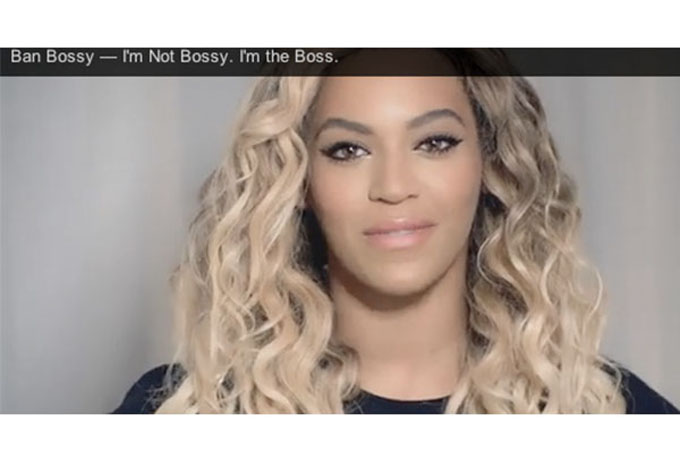
In a recent PSA to ban the word bossy, Beyoncé said, “I’m not bossy, I’m the boss,” and little girls everywhere rejoiced.
Well, maybe that’s not entirely what happened, but I’m sure it did.
Contrary to Bill O’Reilly’s latest conspiracy theory, Beyoncé is not the cause of the downfall of society’s children—quite the opposite. Mrs. Carter is just the woman we need to lead the discussion on leadership and feminism in the 21st century.
Beyoncé may not be your mother’s feminist— but she’s ours.
And as Chimamanda Ngozi Adichie so eloquently stated in her TEDx talk and on Beyoncé’s record “Flawless,” a feminist is any person that believes in the social, political and economic equality of the sexes.
For as long as I can remember, a feminist was the other f-word that no woman in my generation wanted to be associated with: Why? To some it meant that you hated men, fashion, lingerie, and anything involving femininity. There was no way you could be a proud feminist and be married, stylish and love sex too. There seemed to be so much rigidity associated with feminism, a lot of don’ts and very few do’s—until recently.
Consequently, popular culture, and the emergence of unprecedented powerful female characters on TV, has begun to change the way young women view strength and femininity. Thanks to characters like Kerry Washington’s Olivia Pope, women can be sharp and chic at the same time, no longer having to trade one characteristic for the other in fear of not being taken seriously.
From the catwalk to Capitol Hill, the giants of fashion have thrown their hats in the political ring. Just last year the newly minted billionaire designer Tory Burch teamed up with Google and Politico to create Women Rule, a women’s leadership series. Bringing together the original Polinista, Minority Leader Nancy Pelosi, stylist Stacey London and Congresswoman Jackie Speier to name a few participants, to discuss how women can own their woman-ness, climb ladders and essentially conquer the world.
Fashion is no longer a frivolous afterthought in Washington—it’s a multi-billion dollar industry with heavyweight donors like Anna Wintour at the helm—signaling to the world that women are indeed running things—and doing it in heels.
As Hillary Clinton once said, women’s leadership is not only important to their families and communities, but to the world. According to a new report by the Center for American Progress, Women’s Leadership: What’s True, What’s False and Why it Matters, women earn more professional degrees than men and make up 52 percent of the workforce, yet still remain wholly absent from professional leadership positions. Women constitute a paltry 10-20 percent of C-Suite offices, law partnerships and medical deans posts.
Women’s fierce leadership may be the dominant force in popular culture right now, but this power hasn’t fully translated into our politics. Our nation’s policies still reflect an antiquated “Leave it to Beaver” era of the stay-at-home, happy housewife, which is not surprising given that women only make up 15 percent of the U.S. Congress.
It’s indeed time for a revolution. Will it be led by the emergence of feminist voices in popular culture?
If, as Oscar Wilde once opined, “Life imitates art far more than art imitates life,” then Beyoncé is right. The future of women’s leadership, and the revival of feminism, looks flawless.
(Danielle Moodie-Mills is an Advisor at the Center for American Progress for racial justice and LGBT equality. She is also the creator; writer and co-host of Politini, a politics and pop culture show on Blis.FM, bringing audiences the personal side of politics. Her writings have been published in The Atlantic, Essence, Huffington Post, Ebony and more. Follow her musings on Twitter @DeeTwoCents and at www.Politini.com.)
https://www.tsdmemphis.com/opinion/20094-can-beyonce-s-celebrity-reshape-feminism